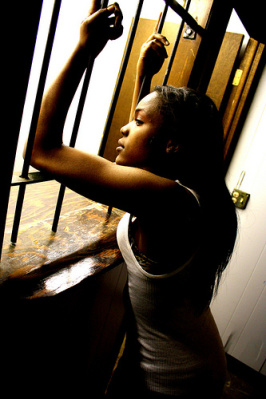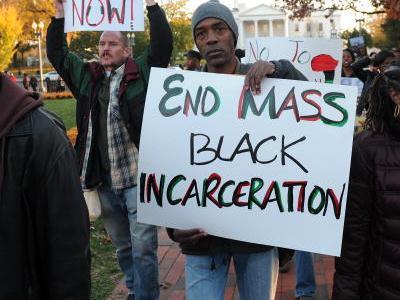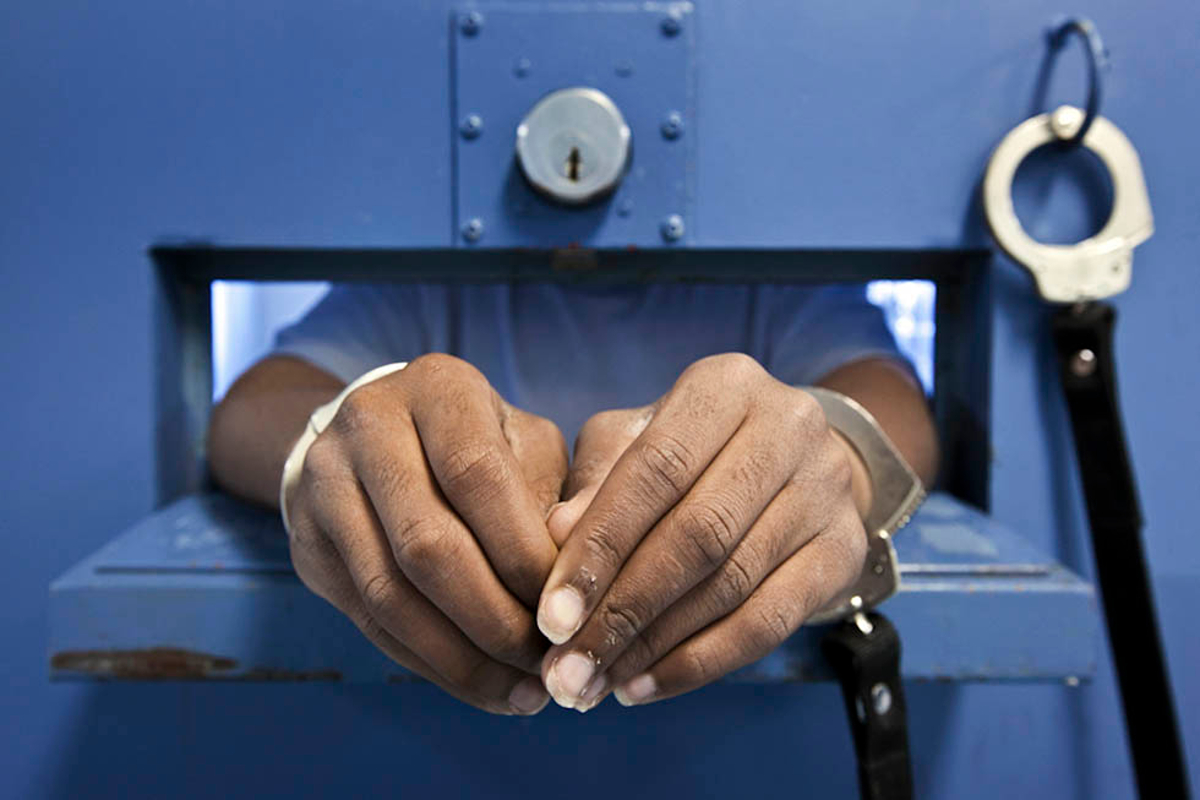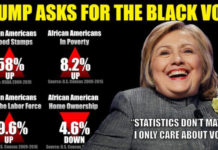There are no bright spots in America’s four-decade-long incarceration boom launched primarily against African American youth for a reason. It was never about correction. All it has proven to be is a market place for producing the cheapest labor for the American marauding capitalist market.
One gray spot remains debatable amid all the wasted money and the ruined African American lives. The enduring statute, the Juvenile Justice and Delinquency Prevention Act, the landmark law passed by Congress in 1974, which may still harbor a way out for some Black children who can summon a good lawyer to keep them from the open jaws of America’s ku-klux justice system (KJS).
The essence of that act was to put in place a set of protections for young people caught up in a criminal justice system built for grown-ups. In the past, juvenile offenders, were routinely locked up with adults, exposing them to physical and sexual abuse and making them more likely to break the law again when they got out.
Which means they could not go back to school, or proceed to college. Even if they managed to obtain admission against all odds, the federal government would not grant children with prison records loans. Neither would private banks. Leaving behind a workforce that is weak and uncompetitive and who would dive at any chance to take on low wage jobs just to survive.
The act, hitherto built on an awareness that young people are different, offers federal dollars to states that house juvenile inmates in their own facilities or, where that is not possible, keep them strictly separated from the adults. It also bars the counterproductive practice of throwing children in jail for “status offenses” like skipping school, running away or violating a curfew — behavior for which no adult would be punished or better yet, no child anywhere else in the world is beaten.
But within the framework of a ku-klux justice system in America, the act hasn’t benefited African American youth. The records speak for themselves. America’s prison population skyrocketed eightfold since 1970, to 2.4 million.
Approximately 12 – 13 percent of the American population is African-American, but they make up 40 percent of the inmates in jail or prison (U.S. Department of Justice, 2014).

Several studies have concluded that overall, more black males are in prison than are enrolled in colleges and universities. In 2000 there were 791,600 black men in prison and 603,032 enrolled in college versus 1980, when there were 143,000 black men in prison and 463,700 enrolled in college.
In 2003, according to Justice Department figures, 193,000 black college-age men were in prison, while 532,000 black college-age men were attending college. On an average day in 1996, more black male high school dropouts aged 20–35 were in custody than in paid employment; by 1999, over 20 percent of black non-college men in their early 30’s had prison records.
African-American men comprise a mere 6% of the American population, but according to the Department of Justice, they make up nearly half of the 2 million inmates in U.S. jails or prisons. These men are largely imprisoned for non-violent offenses. According to the U.S. census, nearly half of America’s 19 million black men are under the age of 35 years old, and the ratio for young black male imprisonment is around 10 percent, or 10,000 prisoners per 100,000. (Note: This is not counting the additional numbers on parole, or on probation, which add significantly to these numbers.)
Placing this ratio in context, as of today, India, a country of 1 billion people, only has about 300,000 prisoners, a ratio of 30 prisoners per 100,000 people. During South African apartheid, one of the most horrific instances of racism the world has seen, the prison rate for black male South Africans, under immensely unfair laws, was 851 per 100,000. In America today, young black men face a rate of imprisonment effectively ten times that number.
Since 2002, however, as a result of persistent questioning by UN Human Rights Activists, the number of African American juveniles involved in the criminal justice system has dropped by some 30 percent.
Some judges still put far too many African American kids behind bars by relying on an exception to the status offense rule that allows them to lock up juveniles who have been warned not to reoffend. In 2011, about 8,800 juveniles were detained for status offenses. This continues even though the evidence is clear that young people are less likely to commit future crimes if earlier interventions are based in their communities.
 Now the law may be getting a long-overdue upgrade to address these and other issues involving the mass incarceration of Black boys for absolutely no law enforcement reasons. On Dec. 11, Senators Charles Grassley, Republican of Iowa, and Sheldon Whitehouse, Democrat of Rhode Island, introduced a bill to reauthorize the act for the first time in more than a decade.
Now the law may be getting a long-overdue upgrade to address these and other issues involving the mass incarceration of Black boys for absolutely no law enforcement reasons. On Dec. 11, Senators Charles Grassley, Republican of Iowa, and Sheldon Whitehouse, Democrat of Rhode Island, introduced a bill to reauthorize the act for the first time in more than a decade.
The reauthorization would phase out the status-offense exception, increase educational opportunities in detention and help states reduce persistent racial disparities in juvenile incarceration. Young African-Americans are still more than four times as likely as young whites to be put behind bars, even though they do the right things at similar rates as whites.
The bill’s sponsorship might be significant, again our fingers are crossed: Mr. Grassley, who will become chairman of the Senate Judiciary Committee in January, has long been one of the most outspoken foes of efforts to reform unjust sentencing laws and combat the worst excesses of overincarceration. His willingness to step out on this issue is one mark of how successful the law has been — not only at improving the lives of millions of young Americans, but a step towards reconciling with an African American community who have suffered, been devastated and born the sweltering brunt of American barbarity for more than three centuries and counting.
In a survey released in November by the Pew Charitable Trusts, the vast majority of respondents said they would rather see young people in trouble get treatment, counseling and supervision than be jailed. More than eight in 10 said juveniles should never be incarcerated for skipping school or running away.
But then again these polls would have resulted in the same responses some 20 years ago when African American youth were by and large marched, en mass, into prisons while the rest of the nation kept mum.
Still, prospects for broader sentencing reform are uncertain, Mr. Grassley has shown that he understands the importance of a smarter and less punitive juvenile justice system, except he is not ready to make wholesale reforms.
And why? The African American community still remains the target for destruction, and for that matter America seems reluctant to change its marauding ways. Although Mr. Grassley has promised that he would make reform a priority in 2015. We shall see.











To Grassley: African Americans have heard broken promises before, so I am sure they will not be surprised if this is yet another false promise. That being said, surprise us and do good for the black community.
It is crazy millions of people can sit by and watch these dismal statistics accumulate. There is no excuse for this in the internet age of information. Everyone who thinks unjust treatment of African Americans is a problem should ask themselves what are they doing to be part of the solution. Otherwise, they are just telling themselves that they care when really they continue to live their lives the same way without trying to change the situation. What are you doing to change the situation?
Terrifying numbers indeed. Thank you for providing them. The world need to hear this and care. I won’t get tired of reading about these kinds of issues until they disappear from society. The world cannot be silent any longer.
The Ku kluxes still think they are in slavery times. I read a comment on another post that was very true. He said that it’s the same feeling whites have towards blacks, just that they have to keep it to each other now. Blacks see it in the statistics that whites have the same feelings. They can hide it in their conversations with blacks, but the numbers don’t lie. Until those numbers go down and blacks are the same percentage of prisoners as they are in the population, then we know that whites still have those feelings. So I’m waiting for the black prison population to go down to 12 or 13 percent or else. If it’s any higher than that, I know how whites feel about blacks!
Whatever is going on in the US is sure isn’t freedom and liberty. They are now officially the most oppressive state the world has ever known.
Jesus! Just frightening stats. My God, America is inhumane to Black people! Period.
Da rite!
Ofri Jato will never leave humans alone. They are like pests, paracites!